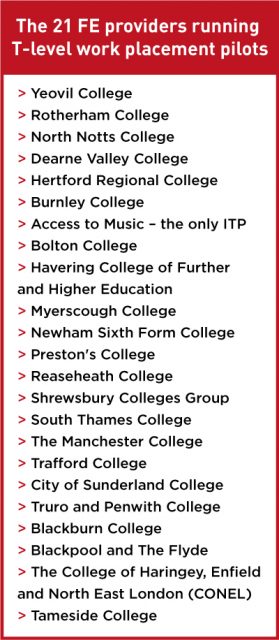Just one independent training provider has been included in the government’s 45-day work placement pilot for T-levels – as well as 20 colleges.
Twenty-one FE providers have been selected to test “high-level principles and models”, and work gets underway at the beginning of this term, ending next July.
The pilots are expected to determine the wrinkles providers could face when delivering this mandatory component of T-levels, which are due to be taught from 2020.
The Association of Employment and Learning Providers has supported the government’s idea of introducing substantial work placements in T-levels, but said it was shocked to find there is just one private provider involved, considering that many of the courses will be delivered by the independent sector.
“We believe that making work placements as part of T-levels is essential to make young people work ready, and that’s why work-based apprenticeships are so successful,” AELP’s boss Mark Dawe told FE Week.
“Independent training providers are largely responsible for driving the growth in apprenticeships through their excellent relationships with employers so it is a little surprising that the government has felt it necessary to include only one ITP in the pilot.”
Paul Warner, AELP’s research director, added that there should be a “spread of pilot provider types” in order to “identify what good placements should look like and identify specific challenges and ways of overcoming them”.
A DfE spokesperson did not explain the imbalance directly.
“The department worked with organisations including the Association of Colleges and the AELP in order to ensure they had the opportunity to feed in to the process,” they said.
“Successful providers were selected on the basis of their ability to deliver a robust delivery plan and overall value for money.”
Around 2,500 students currently on vocational courses across the country are involved with the pilots.
The Challenge Network is leading the work after winning a contract in February to design a framework for how good placements should look. It declined to comment on the situation.
DfE guidance suggests that it expects 180,000 work placements per year, each lasting an average length of 50 working days, in a range of 45 to 60, lasting a minimum of 315 hours.
Officials have so far been clear on their approach, insisting “no work placement, no certificate”, but many college leaders believe the rule will limit young people’s choice as it stands, and want it changed.
In an FE Week investigation into the feasibility of the rule, David Hughes, the boss of the AoC, said it would “punish” young people to make work placements mandatory.
“The danger is you limit people’s choices to what they can attend on a local basis in labour markets that are sometimes very limited in scope,” he said.
“You might not have engineering, manufacturing and creative, for example, where you live, so does that mean you can’t do any of those? That doesn’t feel right or fair.”









Your thoughts